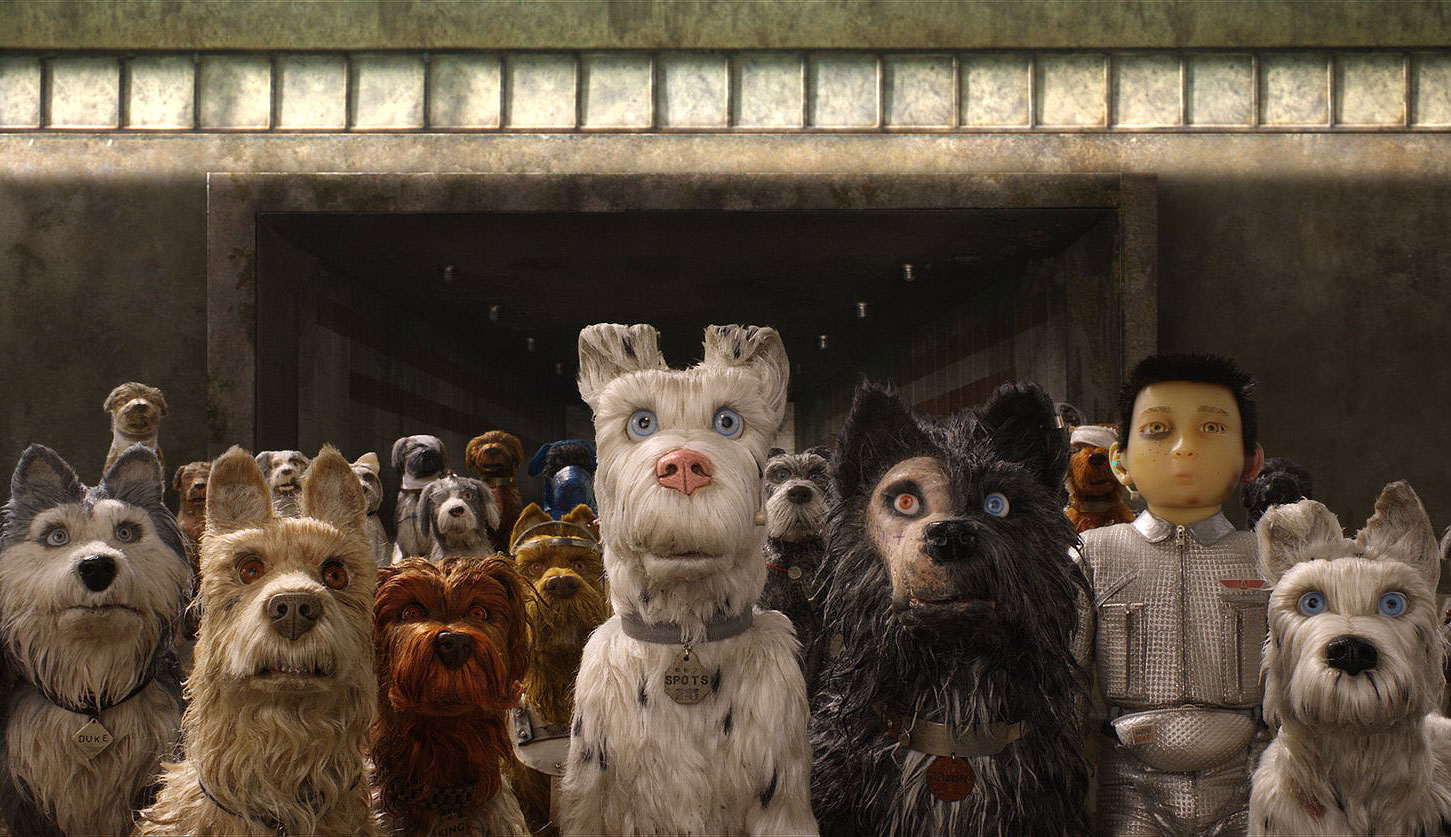
All artists have their idiosyncrasies. Even the lesser talented ones that imitate but never innovate have particular ways of filtering their influences into their work. But those with a singular vision are always easy to distinguish. Since “Rushmore,” Wes Anderson’s mark has been instantly identifiable. Whether it’s the central/symmetrical framing of his blocking, his singular color palettes or his use of Futura font, there is an unmistakable stamp that Anderson has put on all of his films. So it is impressive to see Anderson and his collaborators engage in a fantastical epic, done in stop-motion, that is singularly from his mind but still feels fresh and new. “Isle of Dogs” is a funny and poignant film with a strong undercurrent of messaging that never feels forced or awkward. Anderson has created a world unlike any other yet fully within his established style, and the results are incredible.
Set 20 years in the future in the fictional Megasaki City, an epidemic of canine overpopulation combined with possible dangers (dog flu and snout fever) posed to the human citizens leads to all dogs being banned from the mainland and relocated to Trash Island. Once on the island of discarded refuse, the dogs are left to their own devices to figure out how to survive, including forming their own groups. One such group of dogs (Bryan Cranston, Bill Murray, Jeff Goldblum, Bob Balaban and Edward Norton) stumbles upon Atari (Koyu Rankin), a young boy who crashed on the island while searching for his loyal dog Spots (Liev Schreiber). Back on the mainland, the government continues to conspire in its anti-canine plotting to eradicate all of the dogs while contending with a growing student movement to save Atari and his canine companions. Fighting off robots, aggressive dogcatchers and the perils of the island, Atari and the dogs delve further into the discarded land of exile in a bid to save Spots and all dogkind.
“Isle of Dogs” (based on a story by Anderson, Jason Schwartzman, Roman Coppola and Kunichi Nomura) is truly an epic film in the classic definition of the word. It traverses time and geography with a giant cast of characters, but it does so without being overwhelming or feeling slight. Every character, no matter how small or limited their screen time, is perfectly fleshed out thanks to Anderson’s distinctive writing and the very emotive elements of the brilliant animation. The personality that comes with stop-motion puppets lends itself very well to an expressive form of storytelling usually relegated to children, but the dialogue and narrative are undoubtedly aimed at adults.
It’s very hard to encapsulate and properly articulate Anderson’s style of humor. There is a seriousness to it that’s very dry and presented matter-of-factly that is juxtaposed against the silly whimsy of dogs exchanging gossip and making small talk amongst one other. It’s that abutment of content and context that produces so much laughter. The specificity of language that Anderson has employed in all of his scripts, but especially in “Isle of Dogs,” shows a thorough appreciation of idioms and a simplistic lexicography that belies deep universal truths and emotional insights to which all viewers can relate.
The vocal performances are incredible across the board; each actor gives a real weight to their character that perfectly melds with that Anderson aesthetic and dialogue. Bryan Cranston shines as Chief, a former stray dog who distrusts all humans, bringing a weariness and gruffness to the role that immediately reveals all you need to know about him. Greta Gerwig is also outstanding as exchange student firebrand Tracy Walker, who seeks to learn the truth about Megasaki and save the dogs (as well as her burgeoning crush, Atari), while Frances McDormand is great in a smaller part as the Interpreter. She presents the megalomaniacal ramblings of the villain in a matter of fact way but does so with just enough of a twist that suggests deeper layers to her character.
Most of the humans, it should be noted, are Japanese and therefore voiced by Japanese actors. There are some parts that are translated, but it’s mainly through the cadence of their voices and the mannerisms of the puppets that viewers understand everything they need to know about the plot and the people involved. While there isn’t any whitewashing of characters, there is a larger discussion currently happening about cultural appropriation. It’s evident in the film that Anderson reveres Japanese culture and society, and he uses the setting and language divide to further the theme of miscommunication leading to horrible outcomes for vulnerable groups. However, there’s still an awkward element of a white American using the cultural signifiers of another society, and some may find it problematic for those reasons.
Another facet to the movie that is surprising and effective is an undercurrent of a social message. “The Grand Budapest Hotel” began a new chapter in the filmmaker’s oeuvre that marries his observations of humanity with a subtle message about politics. In that film, it was the importance of style and even whimsy in the face of oppression. In “Isle of Dogs,” the story centers on fearmongering and how it’s easy to blame and discard others when despots turn their ire on them. But it takes courage to press on, no matter the odds or circumstances, and to reaffirm allegiances to one another to move forward together.
“Isle of Dogs” is not for everybody. Some will be put off by the childishness of stop-motion or the lack of polish in the particular way animators move characters about. Others may find that it’s just more of the same from Anderson, again employing those idiosyncrasies that audiences know so well from his work. But for those that have enjoyed his filmography or are seeking out a completely unique cinematic experience, it’s a rewarding time at the theater. “Isle of Dogs” is hilarious, touching and inventive and carries with it a strong and much-needed message of defiant love. Artists leave their fingerprints all over their work, identifying it as something that could only come from them. With “Isle of Dogs,” Anderson’s fingerprints have never been so obvious, but they’ve also never been so powerfully used.
Starring: Koyu Rankin, Bryan Cranston, Edward Norton, Bill Murray, Jeff Goldblum, Greta Gerwig, Frances McDormand, Scarlett Johansson, Liev Schreiber
Director: Wes Anderson


